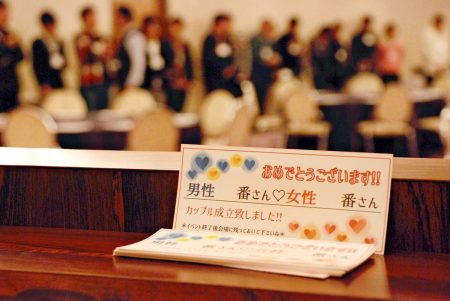September 16, 2025
TOTTORI – The nature of konkatsu matchmaking programs organized by local governments is changing to better suit the preferences of young adults belonging to Generation Z, those who were born from the latter half of the 1990s to around 2010.
Such programs used to be held mainly in party-style settings, but now private companies hired by local governments hold large-scale gatherings that they run with the use of smartphone apps. Artificial intelligence-powered matching systems are also widely used to appeal to Gen Zers, who have been exposed to digital technology from a young age.
The reason for the changes is that local governments are becoming increasingly concerned about the continuously declining birth rate.
On May 24, Tokyo-based matchmaking service company Omicale Inc., having been hired by the Tottori prefectural government, held a matching event at the Tottori Sand Dunes in Tottori. More than 100 men and women in their 20s and 30s used an app to exchange “likes” with each other to display their interest.
If two people “liked” each other, they would be able to communicate by voice call. Paired up participants talked about their whereabouts on the vast dunes before meeting up and enjoying activities such as yoga together.
The program, which allows participants to meet 50 people of the opposite sex at once for a fee of just ¥1,000, thanks to national government subsidies, is believed to have appealed to Generation Z, who prioritize time and cost performance.
According to the prefecture, 145 people applied for the event, which only had 100 available spots.
Twenty-eight couples were successfully formed on the day, for a matchmaking success rate of 56%. This was nearly double the typical success rate of about 20%–30% at ordinary matchmaking events.
A 36-year-old female participant was one of the successful participants. “I felt safe since it was organized by the prefecture. There was no stiffness, either, making it easy for me to participate without worrying,” she said.
Private sector know-how
The prefecture’s focus on supporting matchmaking with the help of the private sector stems from their concerns about the worsening population decline. Tottori has a population of less than 530,000, the smallest of any prefecture, and the marriage rate there is now nearly 30% lower than before the COVID-19 pandemic.
Alarmed by the situation, the prefecture strengthened its matchmaking support efforts in fiscal 2023. In addition to traditional matchmaking services, it began hiring private companies to hold large-scale matchmaking events in fiscal 2024, an idea thought up by young employees of the prefectural government.
“With the outflow of young women to metropolitan and other areas, the population of the prefecture will continue to decline if no countermeasures are taken. We want to respect the needs of young people and support those who wish to marry,” said an official of the prefectural government’s division for measures to support child-rearing and halt the trend of low birth rates.
The “Tottori model” has also spread to other municipalities.
In mid-May, the city of Kanazawa held its first Tottori-style matchmaking event. About 120 men and women participated, and 43 couples were successfully formed, surpassing in one day the 26 total couples that were formed at traditional matchmaking events held by the city between 2016 and 2024.
“Matchmaking events run by local governments tend to make participants feel more secure. This, combined with the use of private sector know-how, brings them an increased sense of satisfaction,” Omicale President Masato Shimonagata said.
32 prefectures introduce system
The use of AI-based matchmaking systems and apps among local governments is also increasing. According to the Children and Families Agency, Tokushima, Kyoto and 30 other prefectures had begun using them as of the end of fiscal 2023.
Tokyo, which adopted such a system in September 2024, verifies the identities of matchmaking program participants through a certificate of singleness issued by a municipal government, along with online interviews. Based on answers to about 100 questions about personality and values, AI introduces program members to other participants who are found to be potentially compatible partners.
The metropolitan government says that more than 20,000 people had applied for its matchmaking program and 32 couples had gotten married as of May 20.
Ehime Prefecture in 2014 became the first prefectural government to use this kind of system. Participants’ information is put into a database, and they are shown potential partners who are seen as likely compatible with them.
The prefecture said it plans to continue using the system, despite the spread of privately-run matching apps, because a government-run system provides users with a particular sense of trust.
Many local government-sponsored matchmaking efforts began in fiscal 2013, when the central government began providing subsidies to local governments making efforts to address declining birthrates in their communities.
The scale of the national budget for the provision in fiscal 2013 was ¥3 billion, but that number had more than tripled to ¥9.3 billion by fiscal 2025. Thirty-nine prefectures have now established marriage support centers, according to the Children and Families Agency.
In recent years, however, some local governments have stopped offering marriage support programs.
Wakayama Prefecture organized matchmaking events from fiscal 2013 to fiscal 2023 that led to the formation of 584 couples, but the program was discontinued in fiscal 2024 due to people’s increasing use of privately-run matching apps. The prefecture now focuses on childcare support, such as providing free childcare for every child a couple has after the second.
The city of Akitakata, Hiroshima Prefecture, discontinued its support for matchmaking events and other programs in fiscal 2021. Only about 60 marriages resulted from city-run matchmaking programs over the 12 years from fiscal 2009 to fiscal 2020, leading the municipal government to conclude that the programs were ineffective.
“There was also the opinion that it is insensitive for the administration to push people to marry,” a city official said.


AloJapan.com